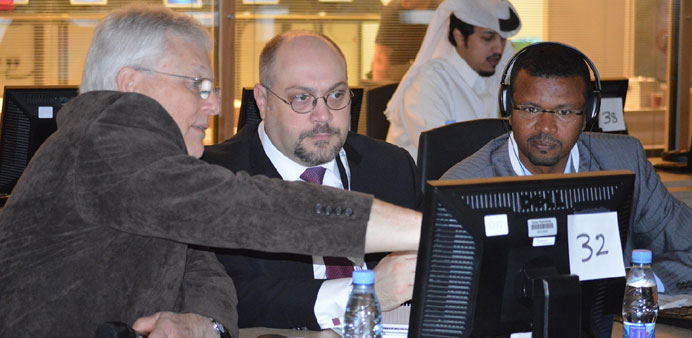|
Qatar University (QU)’s Social and Economic Survey Research Institute (Sesri) hosted two four-day training workshops in March on research methodology and sampling to build the capacity of trainees in the area of research and survey design. |
The first workshop session introduced about 80 trainees to the use of Statistical Package for the Social Sciences in research design, as well as hypotheses formulation, testing and cross tabulation, while the second explored sampling principles with more in-depth treatment of the practical application of the concepts.
The participants who hailed from various Doha-based and regional organisations had the opportunity to receive training and guidance from researchers of Sesri and the University of Michigan Institute for Social Research (ISR).
Sesri director and QU associate V-P for Research, Dr Darwish Alemadi, said developing well-trained researchers who are able to design their own studies and collect and analyse their own data is essential for individual and national advancement. “Sesri’s endeavours are well-aligned with local efforts to build capacity in the area of social science research,” he added.
Sesri senior researcher Dr Kien Trung Le noted that the sessions presented the trainees with applied techniques that enable them to hone their data analysis skills.
One of the workshop instructors, well-known ISR survey methodologist Prof James Lepkowski, said: “Trainees learned about some of the things they need to watch out for when designing their own surveys and things they need to avoid that are common errors in design. Workshops like these help researchers think about the best ways to get samples that truly represent a diverse population like the one in Qatar.” Prof Lepkowski is also director of the Michigan Programme in Survey Methodology.
The trainees who came from backgrounds in statistics and other diverse fields found the workshops to be useful in introducing them to concepts outside their direct frame of work, as Norah Jaber al-Gufrani from Qatar Statistics Authority noted: “The workshops helped me identify new survey sampling techniques that are closely related to my scope of work. Additionally, they provided a platform for discussion and debate and introduced me to other professionals in the field.”
The next training sessions, which are scheduled for May, will engage participants on methods of quantitative and qualitative project evaluation.

